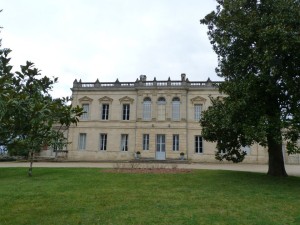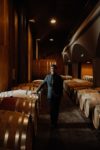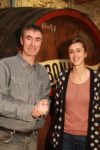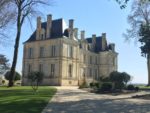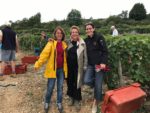Château Reynon by Denis Dubourdieu
“A winemaker is a creator of beauty”
 The property was founded in the fifteenth century by Jean de La Roque, under the name of Chateau Béguey.
The property was founded in the fifteenth century by Jean de La Roque, under the name of Chateau Béguey.
During the eighteenth century the Chateau passed into the hands of the family “Carle de Trajet“. This family will remain only a short time at the head of this property. The French Revolution produced its effects and the family emigrated as their property was declared a “national property”. Indeed, following the change of regime all the social trouble that it caused, the property of the nobility and the clergy was seized and sold to fix the crisis generated by the Revolution.
 The property then, was sold by the state and purchased by the family Laspeyrère. Around 1850’ she shave the former home to erect the building as it is known today. It will also generate the change of the name of the vineyard from “Château de Béguey” to “Château Peyrat”
The property then, was sold by the state and purchased by the family Laspeyrère. Around 1850’ she shave the former home to erect the building as it is known today. It will also generate the change of the name of the vineyard from “Château de Béguey” to “Château Peyrat”
In 1958 the property was bought by Jacques David (father of the wife of Denis Dubourdieu). The property was then in a very bad state in terms of both buildings of the vineyard.
Denis Dubourdieu arrived at Chateau Reynon in 1976. He began replanting the vines and the restoration of the production system. At the end, 37 years on this property he planted almost all the vineyards, and today comprises one third and two thirds white red
 How did you come to the world of wine?
How did you come to the world of wine?
It is above all, family. Denis Dubourdieu was born at the Château Doisy-Daëne (2nd Grand Cru de Sauternes) in 1949. He comes from a family of winemakers in the region of Graves / Barsac since the 18th century.
“Falling around small things” biology, science and life in the countryside, being part of his life, it was only natural that he choose to follow oenology / viticulture.
 What he likes in this job is “a combination of artistic vision of the world to work the fruit of the earth … a winemaker creates beauty. Like a cook. ” In this business the winemaker “creates a raw, in fact evolves beyond the work of a generation, extending the work of his parents.” What a beautiful presentation of the winemaker work! And as you have probably understood it is not simply a passionate world of wine but also of art (music, literature).
What he likes in this job is “a combination of artistic vision of the world to work the fruit of the earth … a winemaker creates beauty. Like a cook. ” In this business the winemaker “creates a raw, in fact evolves beyond the work of a generation, extending the work of his parents.” What a beautiful presentation of the winemaker work! And as you have probably understood it is not simply a passionate world of wine but also of art (music, literature).
Today Denis Dubourdieu has 5 properties (Château Doisy-Daëne, Clos Floridène, Chateau Cantegril, Chateau Haura) and advises over 70 areas around the world. He is considered one of the best specialists of the winemaking and aging of white wines.
 According to you how is a perfect wine?
According to you how is a perfect wine?
A wine can’t be perfect for everyone. The tasting is an art that is very subjective, it depends on individual sensitivity.
“For me, the perfect wine to be delicious and unique, inimitable, that is to say, marked by the spirit of the place. (This is something “trivial” to say but not easy to do). Nature can’t do this work alone, we need the winemaker. The winemaker has a vision of the beauty of wine that can be achieved in this place. ” This calls for sensitivity as much as his skill. It is not enough to feel vaguely that the vine associated with a place can do, we need to help that happen.
We must also know how to avoid defects that can hide or alter the expression of terroir.
“In my opinion, a perfect wine is one that expresses the purity, the genius of the place that makes it so delicious.“
A bottle of wine is a source of conviviality, a moment of happiness. “For wine we offer happy moments. It produces 550,000 bottles on our properties. If each bottle is tasted by four persons, then it is 2.2 million times happiness. ”
 What kind of wine do you recognize in your property?
What kind of wine do you recognize in your property?
“We need nature to guide where you want it to go but intervening as little as possible“
Denis Dubourdieu looks for, in addition to “highlight the genius of the place,” the purity of the wine. But also some wine’s complexity, however complexity is not complication. This epicurean wine and food, lover likes to say that wine is successful when “we lack the words to describe it when you taste.”
“The art is to hide the art, such as Ingres said, pressing the painter (the winemaker here) should not be overly noticeable risk denouncing the hand and betraying the spirit.” It is not necessary that during the tasting we can guess how the wine is made, or even that it is the question. Instead, we must seize this moment with the beauty and goodness offered by tasting a delicious wine.
“My wines are primarily designed to be drunk and not only to be tasted and rated. The wines made to be noticed and spit must impress the taster and crush their competitors, their power more than finesse. These are not necessarily the most drinkable. By dint of making wine designed to be spit and not to be drunk, it is not surprising that in drink less “
The anecdote:
 Denis Dubourdieu is not only passionate about the world of wine, sailing offshore is a practice that he has done for a long time.
Denis Dubourdieu is not only passionate about the world of wine, sailing offshore is a practice that he has done for a long time.
The story of the week for an output frame sailing in the Bay of Biscay. Accompanied by friends, Denis Dubourdieu sailed from Arcachon to Santander. The forecast announced the arrival of a depression with a south wind. In the morning, while he was on duty, he felt, at sea, a strong smell of Sauvignon a little plant, with hints of boxwood and broom. Believing the victim of an illusion olfactory, or even a certain obsession (because of his research on the flavor of this variety), he woke his shipmates, they confirmed that offshore wind was indeed the smell of Sauvignon. It disappeared as quickly as it had arrived.
 Shortly after, while the Cantabria coast stood on the horizon, a strong smell of eucalyptus appeared. The journey continued to a safe harbor before the gale announced it into the Bay of Biscay. They returned to his laboratory in Bordeaux, Denis Dubourdieu resumed his work on plant aromas present in Sauvignon. Reflecting on his race at sea and the amazing succession odor felt the approach of the Spanish coast, he analyzed by gas chromatography of an extract of eucalyptus leaves, he discovered that this species, in addition to eucalyptol, contain some key molecules aroma of Sauvignon wines. He understood why some tasters use eucalyptus as a descriptor of the aroma of the wines of this varietal. He also understood what had happened at sea a few days earlier, the south wind from the eucalyptus forests of the Cantabrian coast had separated, ocean current, eucalyptol (which gives the eucalyptus smell dominant) component of the minority “boxwood, broom” of this flavor that is typical of Sauvignon wines.
Shortly after, while the Cantabria coast stood on the horizon, a strong smell of eucalyptus appeared. The journey continued to a safe harbor before the gale announced it into the Bay of Biscay. They returned to his laboratory in Bordeaux, Denis Dubourdieu resumed his work on plant aromas present in Sauvignon. Reflecting on his race at sea and the amazing succession odor felt the approach of the Spanish coast, he analyzed by gas chromatography of an extract of eucalyptus leaves, he discovered that this species, in addition to eucalyptol, contain some key molecules aroma of Sauvignon wines. He understood why some tasters use eucalyptus as a descriptor of the aroma of the wines of this varietal. He also understood what had happened at sea a few days earlier, the south wind from the eucalyptus forests of the Cantabrian coast had separated, ocean current, eucalyptol (which gives the eucalyptus smell dominant) component of the minority “boxwood, broom” of this flavor that is typical of Sauvignon wines.
My thanks to Denis Dubourdieu for his hospitality.
 Jonathan Choukroun Chicheportiche
Jonathan Choukroun Chicheportiche
Château Reynon
Website
Facebook
Website of “Cadillac Côtes de Bordeaux”

